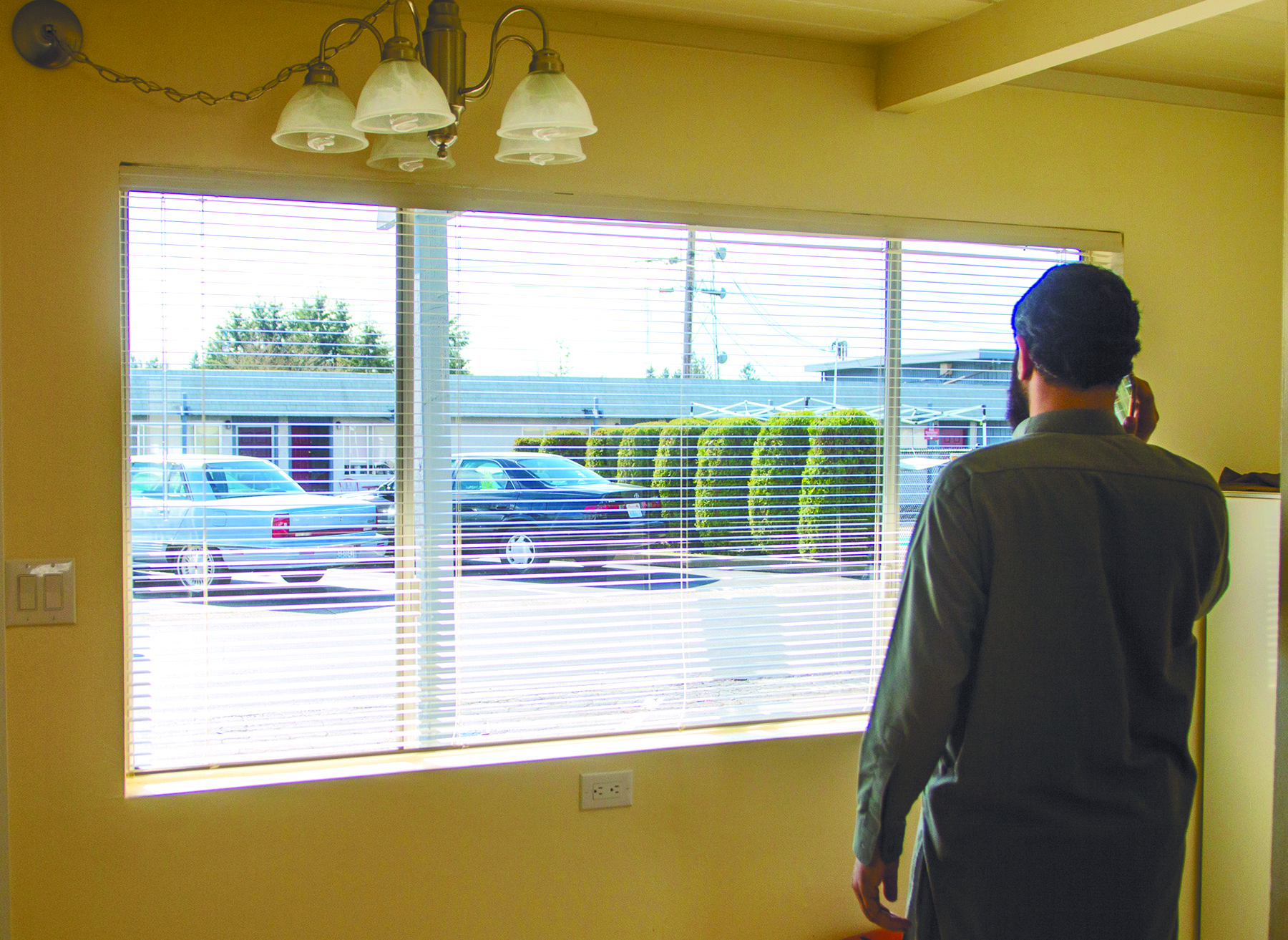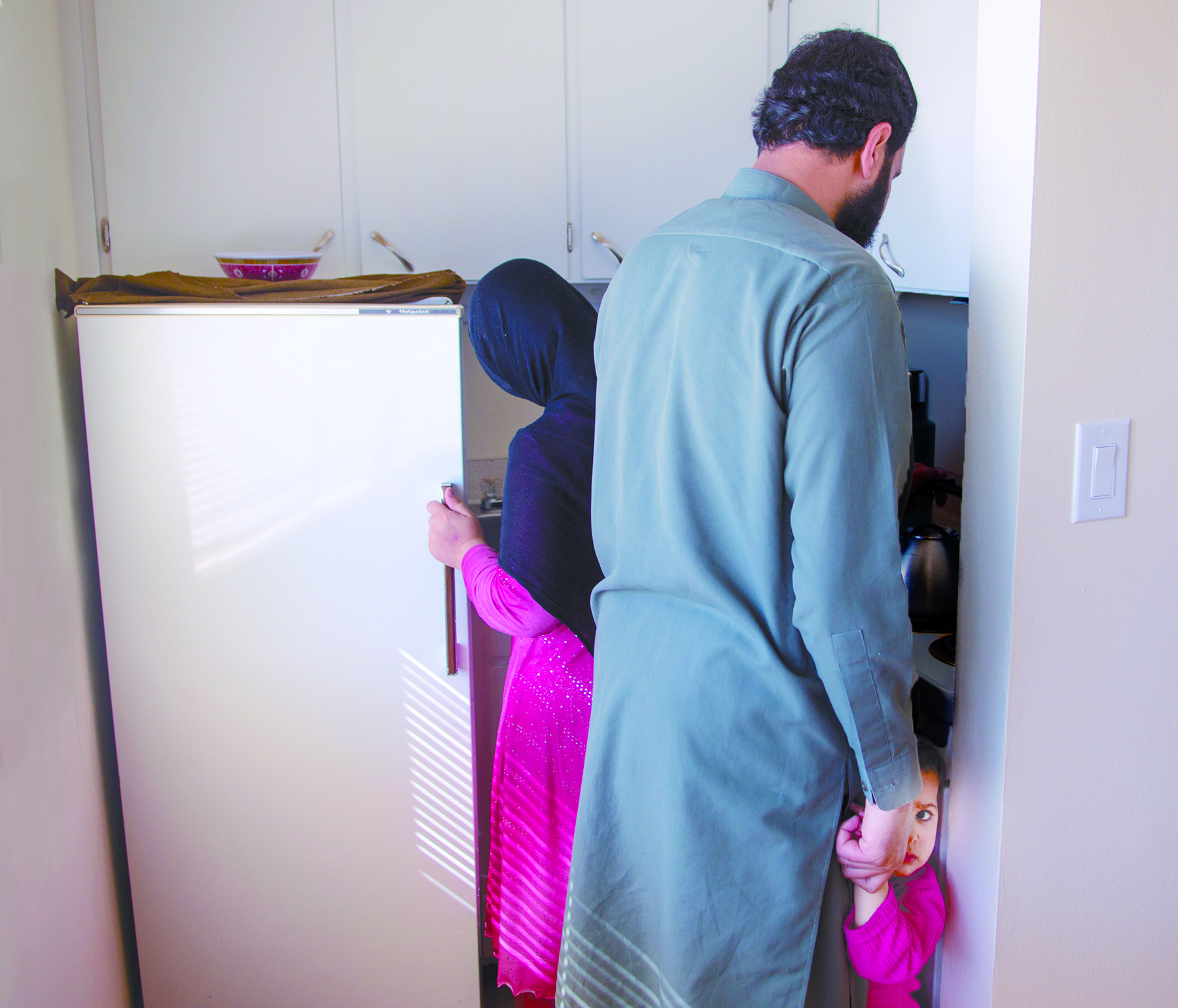Adil wakes up most weekday mornings before the sun’s rays have pierced the few windows of his family’s one-bedroom apartment in Lynnwood.
He does his morning prayers, mindful to face toward Mecca, and has breakfast before departing on the first leg of his journey. His destination is one of two social-services offices he visits each week for workforce training, a requirement to receive a little more than $400 each month in cash assistance from the state of Washington. The trip to either Everett or Mountlake Terrace, depending on the day, takes two bus passes. For this, Adil receives free bus passes from the state to ease the difficulty of traveling.
And yet the trained engineer, who from 2010 until this past January worked with the U.S. Army Corps of Engineers in Afghanistan before moving to the United States, goes to great lengths to preserve even this small allowance. He leaves his apartment each morning 45 minutes early and walks three miles to a bus station farther along the route.
“I am only paying one ticket,” Adil says proudly. “And in this I am saving the resources of the government.”
The workforce training has helped Adil put together a resume and craft both a cover letter and a follow-up thank-you letter. These are things he never used in Afghanistan, but which he knows he’ll need to succeed in his new home—crucial tools, since he is not likely to return to his home country anytime soon.
Adil chose to leave Afghanistan under dire circumstances. He was the subject of regular death threats from militants because of his work with the U.S. government. The fear has followed Adil, who requested that Seattle Weekly identify him by only his last name and not photograph his or his wife’s face out of fear of reprisal against family members back in Afghanistan.
In 2006, Congress created the Special Immigrant Visa program for people like Adil: Iraqi and Afghan interpreters helping the American military and thus endangering their own lives and the lives of their families. The program is intended to expedite the immigration process, offering asylum and promising threatened families safety, housing, furnishings, food, and a guided orientation to American culture.
Yet more than two months after receiving the visa and moving to the U.S., hardly any of that has come to pass, says Adil as he sits cross-legged on a foam mattress pad, one of three that constitute the furniture in his ant-infested apartment off Aurora Avenue. The pads were purchased with some of the $3,300 he received through the Department of Health and Human Services’ Reception and Placement Grant when he and his family arrived. After paying the security deposit and two months’ rent on this apartment, it was all Adil was able to afford, along with a month’s worth of food, a vacuum, an iron, and some bus tickets. It’s a very different existence than the engineer, who made $48,000 USD in his last year with the Army Corps of Engineers, expected.
Worse, says Adil, is the feeling of isolation. He and his wife don’t leave the apartment much aside from grocery shopping, and there’s no one for his wife to talk with. She doesn’t speak English and is just developing her burgeoning writing skills in her own language. In Afghanistan, Adil recalls, relatives and neighbors visited every day. When he and his family arrived at SeaTac in February, only one of the four relatives who live in the area was there.
“Even now my wife says, ‘Please buy us ticket to get back,’ ” Adil says.
But going back to Afghanistan would mean even more hardship. It was there that militants had slipped threatening letters under the front door of Adil’s family home, stating that he and his family would be murdered if they continued to work with the U.S. forces. They moved from his home village in Logar, a rural province in eastern Afghanistan, to Kabul. Militants continued to track him. Adil responded by changing apartments and his car every few months to keep them at bay.
He asked his extended family in Logar to tell neighbors he was unemployed and had left to search for work in Kabul, rather than talk freely about how he made thousands of dollars each month working with the American government as it sought to win the war and successfully stabilize Afghanistan.
Adil contributed to the war effort by inspecting construction projects funded by U.S. dollars, translating documents from English to the local language, and interpreting for Army Corps of Engineers supervisors at job sites and meetings. Adil is one of tens of thousands of interpreters who worked with the U.S. in Iraq and Afghanistan during the two decade-long wars, and one of roughly 2,900 since 2007 who have emigrated to the U.S. after their lives were threatened. (More than 10,000 SIVs were issued last year to Iraqis and Afghans who worked for the U.S. government in other capacities, according to State Department figures.)
Adil’s hopes that he and his family could stay in their homeland ended in March 2013—three years after he began working as a translator and project inspector with the USACOE—when he was nearly abducted on his way to inspect a U.S.-funded project. That month he started a SIV application.
The SIV program was largely unknown to the American public until 2013, when it emerged under a cloud. Reports of immigrants’ experiences with the program began to surface in the media, with the process being described as “prohibitively complicated and painfully slow” by PBS NewsHour in 2014 and as something beyond Kafkaesque, as John Oliver explained on Last Week Tonight in October 2014, “because compared to this, waking up as a cockroach is normal.”
The process was recently streamlined, and its effectiveness is clear. The number of Afghans who, like Adil, worked for the U.S. government and were granted SIVs jumped from a low of three in 2011 to an estimated 3,441 in 2014, according to State Department data. Still, the average time applicants spend waiting for approval is somewhere between three and four years, according to Matt Zeller, a former soldier and head of No One Left Behind, a nonprofit that advocates on behalf of Iraqi and Afghans who have worked with U.S. forces in war zones.
As an SIV applicant, Adil had three major hurdles to clear. First he had to show that he had provided a year of service to the U.S., then prove that that service put him in clear danger. And finally his application had to be reviewed and independently cleared by the Central Intelligence Agency, the Federal Bureau of Investigations, the National Security Agency, and the Department of Homeland Security to be absolutely sure that he didn’t pose a threat to America. If any one agency deemed Adil a threat, he would have been turned down.
Adil was able to get through the process faster than most, making it onto U.S. soil just shy of two years after he started his headlong run through the bureaucratic gauntlet of the SIV process.
After he arrived in the United States, however, more, unforeseen challenges emerged.
Along with his relative from Lynnwood, Adil was greeted at the airport by a representative of the International Rescue Committee, one of nine charitable organizations, with branches spread across the country, that help SIV recipients adjust to life in America. The DHHS doles out money to these groups so they can provide SIVs the basics required by Congress, such as a place to live, furniture, food, clothing, and job placement training, as well as help navigating their new community and figuring out public-assistance programs.
Within a few weeks, with the DHHS money gone, Adil and his family needed more assistance.
The IRC does offer what it calls a “matching grant program” that covers rent for up to six months; provides volunteers to help orient immigrants; and donates goods to 150 of the roughly 550 people it helps relocate to the Seattle area, both SIVs and refugees. But to receive these benefits, the immigrants must live near the IRC’s office in SeaTac, explains Bob Johnson, executive director of the IRC’s Seattle office.
Johnson says the program has a de facto geographic requirement because the IRC provides bus fare to participants, and the organization doesn’t have the money to pay for someone traveling from a distance. “Since he’s in [Lynnwood], he can’t really participate in the matching grant program,” Johnson says.
Adil didn’t learn that he wasn’t eligible until after his family had settled into the Lynnwood apartment. He called the IRC to find out how he could get furniture for the apartment. He was told to come into the office. A $300 taxi ride later, Adil learned that he lived too far away from the IRC’s office.
“It’s like something jokes . . . I said, ‘Pretend I’m close to your office,’ ” Adil says. “It’s hard for me to come because I have nothing.”
The IRC gave little assistance to Adil as he attempted to navigate the available benefit programs. Adil was able to apply for food stamps with some ease, but says he ended up traveling to the social-services office three times over a five-week period before he was able to enroll in a welfare program that pays $478 each month.
For all the difficulty, however, Adil said the program’s mandatory workforce-training classes have helped. His resume and cover letter are now in line with American standards, and he’s taken to applying online each night for a dozen or so jobs.
After fielding questions from a reporter, representatives from the IRC brought Adil beds, a non-functioning television set, and toys for his daughter, along with a promise to bring furniture. They also brought a $500 check, which Adil says he combined with his cash assistance check to pay rent for April.
One of the unintended consequences of the new streamlined SIV process—which has seen the number of Afghans entering the country through the program increase by more than 500 percent from 2013 to 2014 alone—is that there is now a lack of money available for organizations like the IRC to help, says Zeller. It’s led to a massive decrease in the quality of help organizations such as the IRC can provide, which is bad for both the SIV recipients and the U.S., Zeller adds.
“When you realize that people are so disgusted with their treatment here in America that they would rather choose to potentially go home and die . . . People are gonna come to see the promises that America made as essentially meaningless,” Zeller says.
Johnson counters that funding is not the issue. The IRC and organizations like it work with DHHS to determine the number of SIVs and refugees each group can take on and manage over the course of a year. Johnson, who’s been with the IRC for 39 years, says the number of people his chapter helps each year has stayed steady at around 550.
The section of DHHS responsible for administering the SIV program, the Administration for Children and Families, also provides money for refugees, Cuban and Haitian entrants, asylees, trafficking victims, and unaccompanied children. Last year’s budget for the ACF contained enough for about $600 per person, according to figures from the DHHS’s report, titled “Justification of Estimates for Appropriations Committees” for fiscal year 2016. But the number of SIV recipients entering the country from Iraq and Afghanistan is growing, as is the number of unaccompanied children—mostly from Central America—which has more than doubled to nearly 57,500 between 2013 and 2014, leaving officials to figure out how to stretch the same number of dollars to provide mandated services to an ever-growing population.
Zeller feels that America owes these interpreters a debt. He views the translators as soldiers, veterans who stood shoulder to shoulder with U.S. forces, and people who wouldn’t be in the country if the U.S. had succeeded in stabilizing Iraq and Afghanistan.
“If you want to call them refugees, they’re refugees of our own creation, which means we owe them more,” Zeller says. “The way that we treat these people as they arrive here will ultimately be reflected on our forces who are still fighting down range.”
The path forward is clear for Adil. He plans to get a job, any job. Then a better job. Then Adil plans to move into an entry-level position in the engineering field and start working toward his master’s degree. He’s determined. After all, this isn’t the first time his family has had to start over in a new country; when he was young his parents fled to Pakistan when the Russians invaded.
“We are learning to learn new culture and new life here and, like we were in the refugee camp in Pakistan, we started from zero,” Adil said. “Here is also again the second time in my life to start from zero.”





